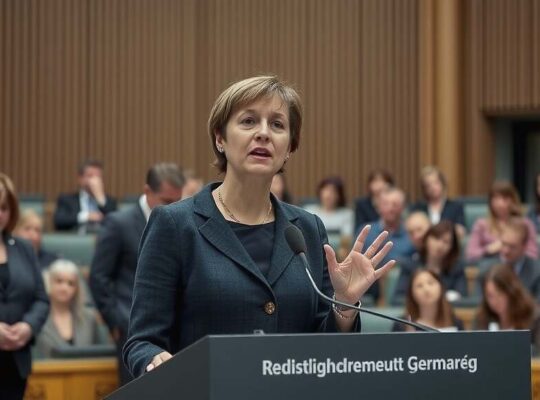The leadership of the Junge Union (JU), the youth wing of Germany’s ruling CDU, is escalating pressure on Chancellor Friedrich Merz over the government’s proposed pension reform package, signaling a potential fracture within the conservative bloc. Just days before the JU’s annual conference and with the Chancellor slated to address the gathering, JU Chairman Johannes Winkel has publicly challenged Merz’s commitment to generational fairness and voiced skepticism regarding the financial implications of the proposed reforms.
Winkel’s remarks, published by the Redaktionsnetzwerk Deutschland, directly challenge Merz’s prior declarations of intent to forge a new “generational contract”. He questioned the compatibility of a €200 billion pension package with such a commitment, explicitly referencing the Chancellor’s earlier government declaration. The JU’s unease stems from perceived overreach in the proposed legislation, particularly regarding cost projections that extend beyond the commitments outlined in the existing coalition agreement.
The crux of the dispute lies in a provision within the draft legislation, championed by Labour Minister Bärbel Bas (SPD), which stipulates that the pension level should remain “approximately one percentage point higher than currently stipulated in law” after 2031. The JU argues this addition represents an unwarranted expansion of the coalition’s initial agreements and would saddle future generations with an unsustainable financial burden. They contend that such a departure from the agreed-upon framework lacks the generational responsibility Merz has publicly endorsed.
Despite calls for compromise from within the CSU, most notably from party leader Markus Söder, Winkel reiterated that the JU is unwavering in its opposition to the current drafting of the pension reforms. He highlighted the significance of the JU’s conference as a critical platform to voice these concerns directly to the Chancellor, underscoring the expectations of the JU delegates.
Adding further complexity, Winkel criticized Merz’s lack of direct engagement with young conservative parliamentarians, despite the Chancellor’s declared intention to take personal responsibility for resolving the pension dispute. A group of 18 young CDU/CSU representatives in the Bundestag, led by Winkel, has warned they could block the reform’s passage through parliament, creating a significant hurdle for the government’s legislative agenda and exposing a potentially deep ideological split within the conservative ranks. The situation now tests Merz’s leadership and his ability to bridge the chasm between the government’s objectives and the concerns of its own youth wing.












